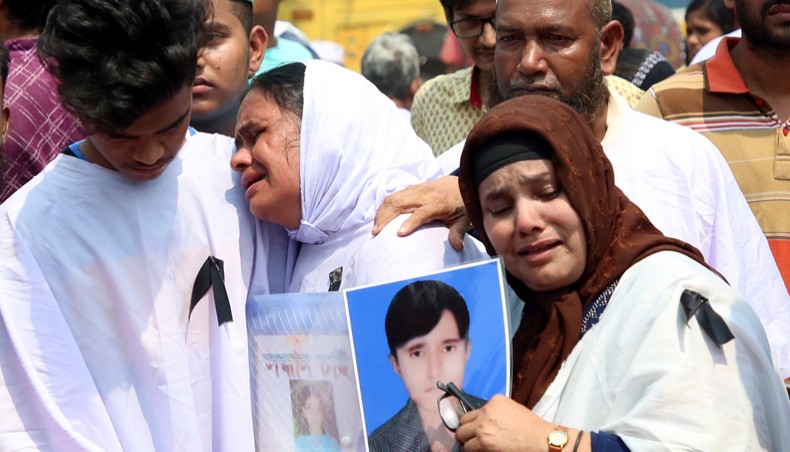Rana Plaza survivors’ sufferings deepen
The sixth anniversary of Rana Plaza collapse was observed on Wednesday as sufferings of the survivors of the world’s worst factory building collapse deepened with many of them facing various physical and mental problems.
The injured survivors believed that their health condition deteriorated as they lacked proper treatment and medication following their release from hospitals.
Yanoor, now 22, rescued three days after the collapse, was given treatment at different hospitals immediately after the incident as she sustained severe injuries in the legs, head and chest.
Yanoor, on crutches, went to her village in Barishal in 2017 on her release from Centre for the Rehabilitation.
She married a mason but could not continue the married life as her pains backed. Yanoor cannot afford proper treatment, she said.
‘I cannot move without assistance of others. I cannot sleep at night, cannot do any household work,’ she told New Age in front of collapsed Rana Plaza at Savar on Wednesday as the survivors and families of the victims gathered to commemorate the tragedy that left 1,138 people, mostly apparel workers, killed and over 2,400 injured on April 24, 2013.
Mahmudul Hasan Ridoy, Saddam Hossain, Lovely Akter, Feli Begum, Asma and Roksana also shared similar experiences.
A government committee formed following a High Court order immediately after the factory building collapse reported that at least 221 workers needed long term treatment.
Of them 46 workers were paralysed and 25 had amputation.
A recent study conducted by ActionAid Bangladesh revealed that 51 per cent of the survivors remained jobless over the past six years as their physical and mental conditions did not permit them to work.
The study also showed that 49 per cent of the survivors became self-employed or some of them got job.
The injured survivors and families of the deceased along with thousands of people from different walks of life on Wednesday reiterated demand for justice, proper compensation and rehabilitation on the 6th anniversary of Rana Plaza collapse.
They staged protest rallies in front of the collapsed building at Savar, on the outskirts the Bangladesh capital Dhaka while injured worker Mahmudul Hasan Ridoy observed a hunger strike for 11-point demands.
People from different walks of life went to the spot with wreath since morning while the injured victims organised a mass candle lighting event there on Tuesday night to remember their colleagues.
Labour organisations and trade unions from protest rallies urged the government to declare the day as mourning day and establish a monument there in the memory of the victims of the worst industrial disaster of the world.
No trial of Rana Plaza owner Sohel Rana took place in six years since the collapse of the nine-storey building which had housed five apparel factories that made clothes for famous Western brands.
The families of the deceased, injured survivors and workers who suffered from the worst industrial disaster were still waiting for justice as hardly any progress was made in the trial of 14 cases filed in this connection.
Sohel Rana, local Awami Juba League leader at Savar, his parents Abdul Khaleque and Marzina Begum and five apparel factory owners were named in 14 the cases, including 11 filed with the Labour Court.
Although Sohel Rana and 40 others were charged on July 18, 2016 in a case filed on murder charge, none of the 594 prosecution witnesses was examined yet.
Of the 41, only Sohel Rana was in custody while 32 were on bail and six were still in hiding and two died in the meantime.
Garment Sramik Odhikar Andolan leader and Bangladesh Textile Garment Workers Federation president Mahbubur Rahman Ismail said that the families of the deceased and the survivors were being denied of justice.
He demanded that the government must form a special tribunal for the trial of the cases relating to Rana Plaza collapse.
Garment Workers Solidarity president Taslima Akter said that that government was not sincere in the trial of the perpetrators.
She also demanded proper compensation, rehabilitation, a permanent memorial and mourning day in the memory of the disaster.
National Garment Workers Federation president Amirul Haque Amin said that victims were not given compensation even after six years of the incident.
He demanded compensation according to the ILO Convention 121.
Sufia Khatun, mother of deceased worker Faysal, went to commemorate her son from her house at Bakterpur of Savar.
She said that Rana Plaza broken her happy family as her eldest son died in his youth.
National Garment Workers Federation, Garment Workers’ Front, Textile Garment Workers Federation, Garment Workers Trade Union Centre, Bangladesh Udichi Shilpi Gosthi, Garment Sramik Mukti Andolan, Rana Plaza Survivors Association of Bangladesh, Bangladesh Occupational Safety, Health and Environment Foundation, Sramik Nirapatta Forum, Bangladesh Institute of Labour Studies, among others, placed wreath at temporary memorial in front of the collapsed Rana Plaza.
No government officials but Savar police station-officer-in-charge on behave of Dhaka district police placed wreath there though other government agencies and local ruling Awami League leaders used to place wreath there in the previous years.
Injured worker Ridoy lamented that Dr Enamur Rahman, who came in limelight after the Rana Plaza collapse, became member of the parliament and even state minister but he did not go to place wreath.
News Courtesy: www.newagebd.net











